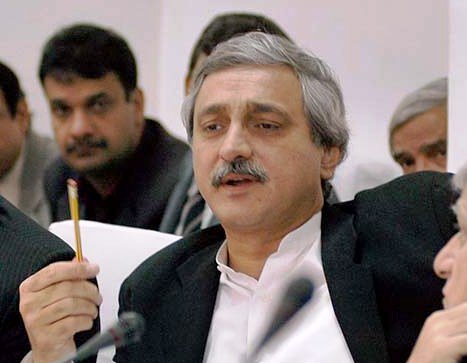
“We have to see what is the scope of honesty,” said Chief Justice of Pakistan Mian Saqib Nisar during the hearing of PML-N leader Hanif Abbasi’s petition seeking the disqualification of PTI General Secretary Jahangir Tareen on the basis of his involvement in insider trading.
Tareen paid fines for insider trading offences committed while he was a federal minister during the Musharraf era.
The three-judge bench, headed by the CJP, on Thursday discussed the interpretation of Article 62 (1) (f) of the Constitution. The bench asked lawyers for both parties to assist in this matter.
Disqualification case: Authenticity of documents still under question, says CJP
The said article says that a person shall not be qualified to be elected or chosen as a member of Parliament unless he is sagacious, righteous and non-profligate, honest and amin, there being no declaration to the contrary by a court of law.
It is to be noted that there were two views on the applicability of this article in the Panama Papers case.
The bench on Thursday observed that the term honesty has a variety of meanings, adding that if someone holds a public office, then the court will have to look at the dishonesty of a public nature.
The court also said that the main scheme of the article refers to a declaration by a competent court of law.
The chief justice observed that whole issue boils down to five words – sagacious, righteous, non-profligate, honest, and amin. He also said that there must be adjudication on these five words.
The CJP also raised questions over the meaning and purpose of these words, adding that the words honest and amin could be interpreted in a conjunctive or disjunctive manner. He also said that sagacious means wise, and if a person is not wise, they should be disqualified. The CJP questioned whether cheating and fraud translate to dishonesty.
The court also posed a question regarding the degrees of dishonesty, asking that if a man is present in his house but his son tells a visitor outside that he is not home, would this qualify as dishonesty.
The bench also questioned whether the court has to examine the aspect of motive in matters related to misdeclarations in nomination papers.
Sikandar Bashir Mohmand, counsel for Tareen, stated that there is no in-depth interpretation of the word ‘honesty’.
In the end, the chief justice observed that parliament and parliamentarians should not be ridiculed and judges should be respected.
‘Sadiq’ Tareen: Is insider trading acceptable, SC asks
He noted that he has heard speculation about his reputation being at stake and suggestions that he should intervene, but added that he would not as he will only act in the interest of the Supreme Court and the country. The CJP also urged the media to be careful with reporting and fact-checking. He said that critics should be aware that the judiciary is also their institution.
Fine challenge
Meanwhile, the court also issued a notice to the attorney general over a line of argument made by Tareen’s counsel.
Mohmand had questioned the legality of the insertion of two clauses in the Insider Trading Ordinance, 1969.
“Provisions relating to insider trading that were part of the 1969 ordinance during the relevant period were sections 15-A and 15-B, which were inserted unlawfully through section 7 (5) of the Finance Act 1995 with effect from July 2, 1995. These were replaced with effect from July 2, 2008, by section 6 (2) of the Finance Act 2008. Insertion of both was in contravention and of mandatory requirements of Article 70 (1) having not been passed by both houses of parliament and clearly, do not fall within the scope of a Money Bill under Article 73 (2) of the Constitution,” said the counsel.
The case was adjourned until October 23.
1729161093-0/liam-(4)1729161093-0-405x300.webp)
















COMMENTS (1)
Comments are moderated and generally will be posted if they are on-topic and not abusive.
For more information, please see our Comments FAQ